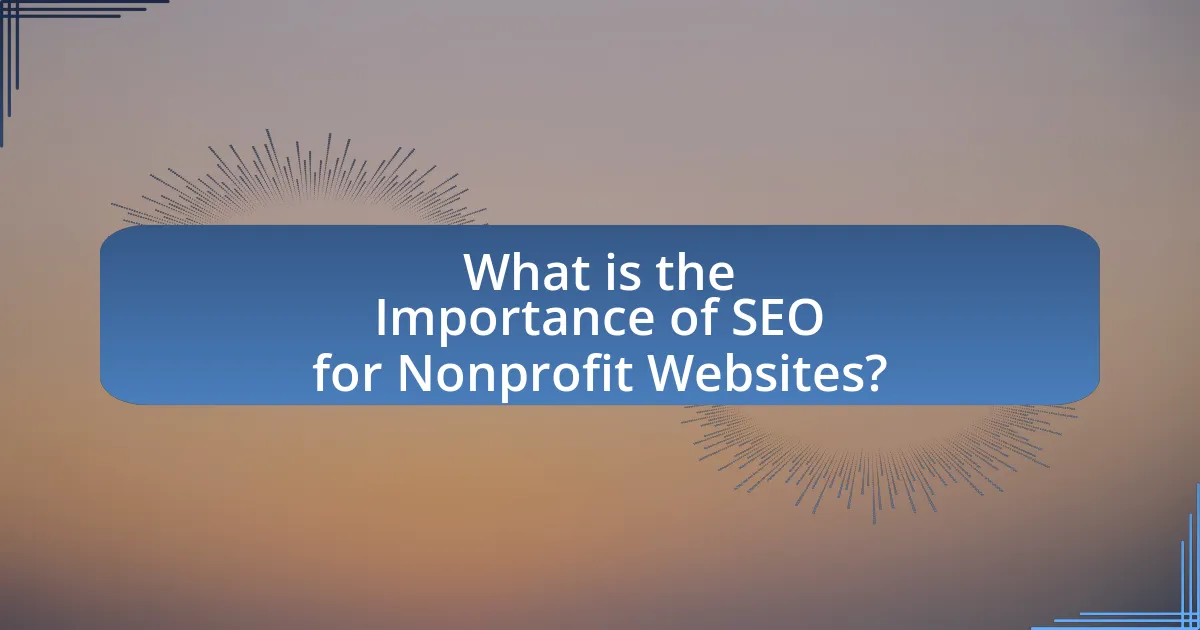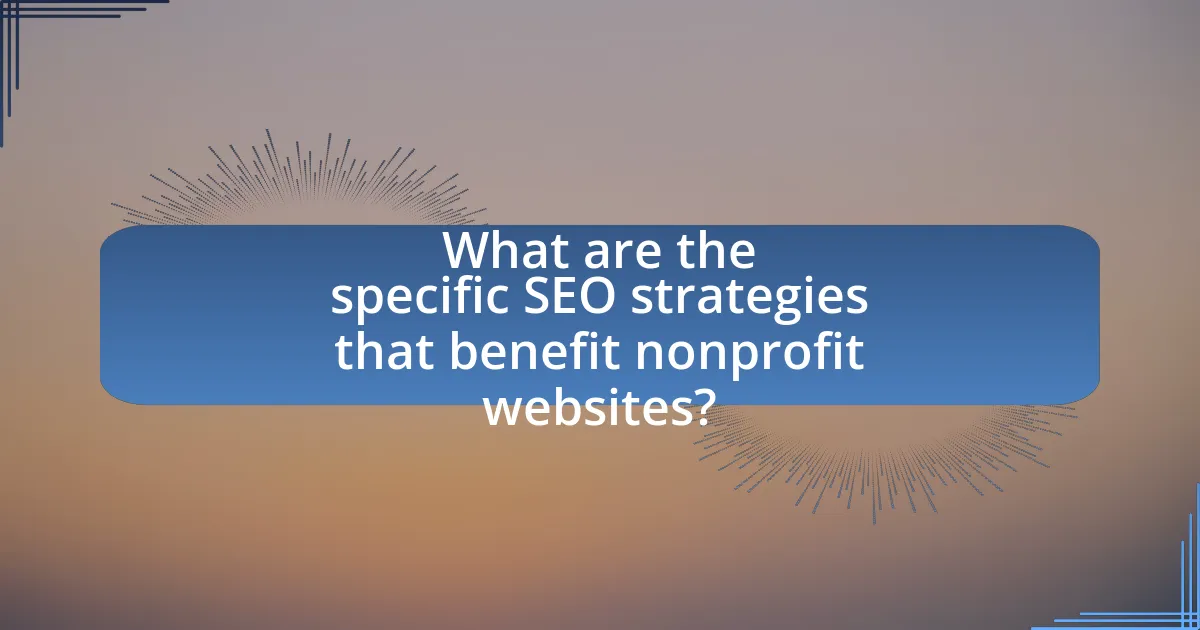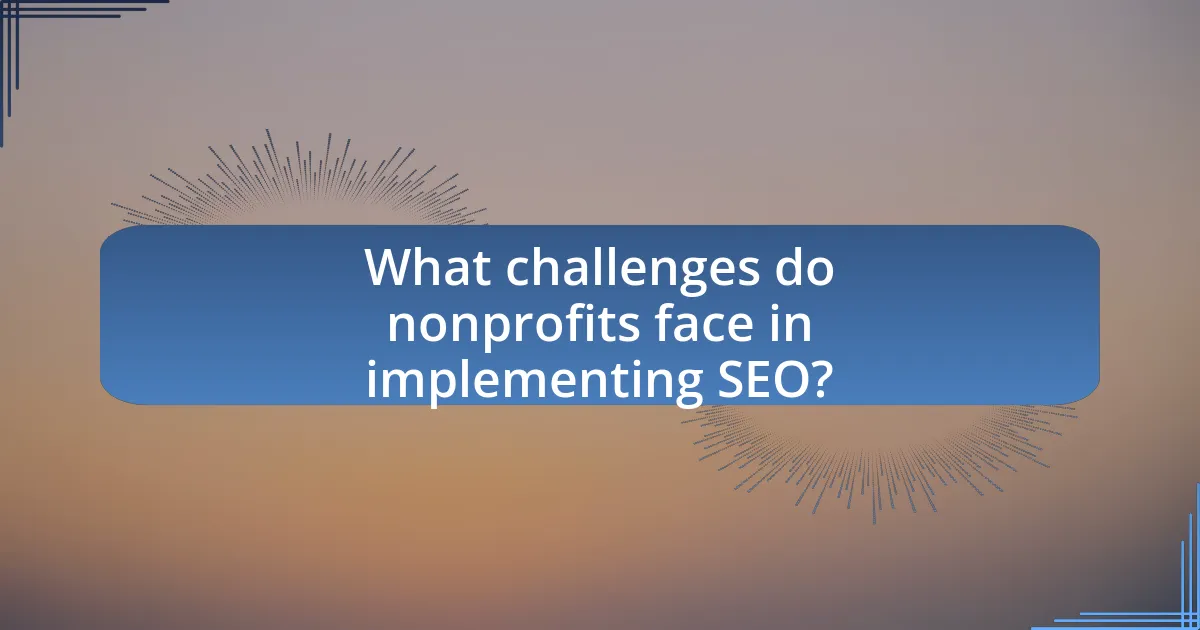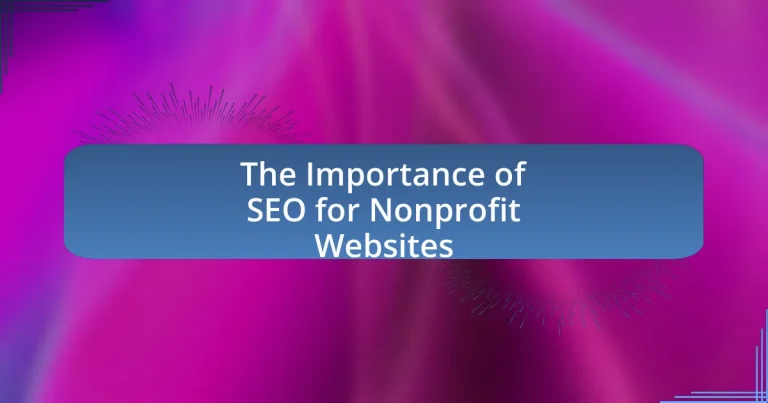The article focuses on the significance of Search Engine Optimization (SEO) for nonprofit websites, emphasizing its role in enhancing visibility, driving traffic, and increasing engagement with potential donors and volunteers. It outlines key SEO elements such as keyword optimization, quality content, mobile-friendliness, site speed, and backlinks, which collectively improve search engine rankings. The article also discusses the impact of improved visibility on donor engagement, the long-term benefits of investing in SEO, and practical strategies nonprofits can implement to optimize their online presence. Additionally, it addresses common challenges faced by nonprofits in executing SEO initiatives and highlights best practices for maximizing their effectiveness.

What is the Importance of SEO for Nonprofit Websites?
SEO is crucial for nonprofit websites as it enhances visibility, drives traffic, and increases engagement with potential donors and volunteers. By optimizing their online presence, nonprofits can ensure that their mission and initiatives reach a broader audience. According to a study by the Nonprofit Marketing Guide, 70% of nonprofits reported that SEO significantly improved their website traffic, leading to higher donation rates and volunteer sign-ups. This demonstrates that effective SEO strategies can directly impact a nonprofit’s ability to fulfill its mission by attracting more support and resources.
How does SEO impact the visibility of nonprofit organizations?
SEO significantly enhances the visibility of nonprofit organizations by improving their ranking on search engine results pages. When nonprofits implement effective SEO strategies, such as optimizing website content with relevant keywords, they increase the likelihood of being discovered by potential donors, volunteers, and beneficiaries. According to a study by the Nonprofit Marketing Guide, 70% of nonprofits reported that their website is their most important marketing tool, emphasizing the need for visibility. Furthermore, higher visibility leads to increased website traffic, which can result in greater engagement and support for the organization’s mission.
What are the key elements of SEO that affect nonprofit websites?
The key elements of SEO that affect nonprofit websites include keyword optimization, quality content, mobile-friendliness, site speed, and backlinks. Keyword optimization ensures that the website ranks for relevant search terms, which is crucial for visibility; studies show that 75% of users never scroll past the first page of search results. Quality content engages visitors and encourages sharing, which can enhance organic reach. Mobile-friendliness is essential as over 50% of web traffic comes from mobile devices, and Google prioritizes mobile-optimized sites in its rankings. Site speed impacts user experience and search rankings, with research indicating that a one-second delay can reduce conversions by 7%. Lastly, backlinks from reputable sources improve domain authority and search engine rankings, making them vital for nonprofit visibility online.
How does improved visibility influence donor engagement?
Improved visibility significantly enhances donor engagement by increasing the likelihood that potential donors will discover and connect with a nonprofit organization. When a nonprofit’s website ranks higher in search engine results, it attracts more visitors, leading to greater awareness of its mission and initiatives. Research indicates that organizations with optimized SEO strategies can experience up to a 50% increase in website traffic, which directly correlates with higher donor conversion rates. This increased visibility not only fosters trust and credibility but also facilitates easier access to information about donation opportunities, ultimately driving higher engagement levels among donors.
Why should nonprofits prioritize SEO in their digital strategy?
Nonprofits should prioritize SEO in their digital strategy because it enhances online visibility, which is crucial for attracting donors and volunteers. By optimizing their websites for search engines, nonprofits can increase organic traffic, leading to greater awareness of their missions and initiatives. According to a study by the Nonprofit Marketing Guide, 70% of nonprofits reported that their website is their most important marketing tool, and effective SEO practices can significantly improve their search rankings, making it easier for potential supporters to find them.
What are the long-term benefits of investing in SEO for nonprofits?
Investing in SEO for nonprofits yields long-term benefits such as increased visibility, enhanced credibility, and sustained donor engagement. By optimizing their websites for search engines, nonprofits can improve their rankings, making it easier for potential supporters to find them. Research indicates that 75% of users never scroll past the first page of search results, highlighting the importance of high visibility. Additionally, a well-optimized site fosters trust, as users often associate higher rankings with credibility. This trust can lead to increased donations and volunteer sign-ups, creating a lasting impact on the organization’s mission. Furthermore, SEO efforts can lead to ongoing organic traffic, reducing reliance on paid advertising and ensuring a steady flow of visitors over time.
How does SEO contribute to the overall mission of a nonprofit?
SEO enhances the overall mission of a nonprofit by increasing its online visibility, which leads to greater awareness and support for its cause. By optimizing website content for search engines, nonprofits can attract more visitors who are searching for relevant information or services, thereby expanding their reach. For instance, a study by the Nonprofit Marketing Guide found that organizations with strong SEO strategies saw a 50% increase in website traffic, directly correlating to higher engagement and donations. This increased visibility not only helps in fundraising efforts but also in mobilizing volunteers and advocating for the nonprofit’s mission, ultimately driving social impact.

What are the specific SEO strategies that benefit nonprofit websites?
Specific SEO strategies that benefit nonprofit websites include optimizing for local search, creating high-quality content, utilizing keywords effectively, building backlinks, and enhancing user experience. Nonprofits can improve local search visibility by claiming and optimizing their Google My Business listing, which can lead to increased foot traffic and donations. High-quality content, such as informative blog posts and engaging stories, can attract visitors and encourage sharing, thereby increasing organic reach. Effective keyword usage involves researching and incorporating relevant terms that potential donors and volunteers might use, which can improve search rankings. Building backlinks from reputable sites enhances domain authority, making the nonprofit’s website more credible in search engines. Finally, enhancing user experience through mobile optimization and fast loading times can reduce bounce rates and improve engagement, leading to higher conversion rates for donations and volunteer sign-ups.
How can keyword research enhance a nonprofit’s online presence?
Keyword research can enhance a nonprofit’s online presence by identifying the terms and phrases that potential supporters use to search for relevant information. By optimizing website content with these keywords, nonprofits can improve their visibility in search engine results, leading to increased traffic and engagement. For instance, a study by HubSpot found that organizations that effectively utilize SEO strategies, including keyword research, can see a 14.6% conversion rate compared to just 1.7% for traditional outbound methods. This demonstrates that targeted keyword usage not only attracts more visitors but also converts them into active supporters, thereby amplifying the nonprofit’s impact and outreach.
What tools can nonprofits use for effective keyword research?
Nonprofits can use tools like Google Keyword Planner, SEMrush, and Ubersuggest for effective keyword research. Google Keyword Planner provides insights into search volume and competition for keywords, helping nonprofits identify relevant terms for their audience. SEMrush offers comprehensive keyword analysis, including keyword difficulty and related keywords, which can enhance a nonprofit’s SEO strategy. Ubersuggest provides keyword suggestions and content ideas based on search trends, making it easier for nonprofits to create targeted content. These tools collectively enable nonprofits to optimize their online presence and reach their target audience effectively.
How do targeted keywords improve search engine rankings?
Targeted keywords improve search engine rankings by aligning website content with user search queries, thereby increasing visibility in search results. When a website incorporates specific keywords that potential visitors are searching for, search engines like Google can better understand the relevance of that content to user queries. This relevance is a key factor in ranking algorithms; for instance, a study by Moz indicates that keyword optimization can significantly enhance organic traffic, as pages that rank on the first page of search results receive over 70% of clicks. By effectively using targeted keywords, nonprofit websites can attract more visitors, ultimately leading to greater engagement and support for their missions.
What role does content creation play in nonprofit SEO?
Content creation is essential for nonprofit SEO as it enhances visibility and engagement with target audiences. By producing high-quality, relevant content, nonprofits can improve their search engine rankings, making it easier for potential donors and volunteers to find them online. Research indicates that organizations with active blogs and updated content see a 434% increase in indexed pages, which directly correlates with higher organic traffic. Furthermore, valuable content fosters trust and authority, encouraging backlinks from other reputable sites, which further boosts SEO performance.
How can storytelling enhance SEO for nonprofit organizations?
Storytelling can enhance SEO for nonprofit organizations by increasing user engagement and generating backlinks. Engaging narratives capture the audience’s attention, leading to longer time spent on the website, which signals to search engines that the content is valuable. According to a study by the Content Marketing Institute, storytelling can increase audience retention by up to 65%, improving the likelihood of shares and backlinks. These backlinks from reputable sources further boost the nonprofit’s domain authority, positively impacting search engine rankings.
What types of content are most effective for engaging supporters?
Visual content, such as videos and infographics, is most effective for engaging supporters. Research indicates that visual content is processed 60,000 times faster than text and can significantly increase engagement rates. For instance, social media posts with images receive 650% higher engagement than those without. Additionally, storytelling through personal narratives and testimonials fosters emotional connections, making supporters more likely to engage and contribute. According to a study by the Content Marketing Institute, 70% of consumers prefer to learn about a company through articles rather than ads, highlighting the effectiveness of informative blog posts and articles in engaging supporters.

What challenges do nonprofits face in implementing SEO?
Nonprofits face several challenges in implementing SEO, primarily due to limited resources, lack of expertise, and competing priorities. Limited budgets restrict their ability to invest in professional SEO services or tools, which are essential for effective optimization. Additionally, many nonprofit organizations lack staff with specialized knowledge in SEO, making it difficult to develop and execute a comprehensive strategy. Competing priorities, such as fundraising and program delivery, often take precedence over digital marketing efforts, further hindering their ability to focus on SEO initiatives. According to a 2021 report by Nonprofit Tech for Good, only 30% of nonprofits have a dedicated digital marketing budget, illustrating the resource constraints they face.
How can limited resources affect a nonprofit’s SEO efforts?
Limited resources can significantly hinder a nonprofit’s SEO efforts by restricting their ability to invest in essential SEO strategies such as content creation, keyword research, and technical optimization. Nonprofits often operate with tight budgets and limited staff, which can lead to inadequate website updates and poor search engine visibility. For instance, a study by the Nonprofit Marketing Guide found that 63% of nonprofits lack a dedicated marketing staff, which directly impacts their ability to implement effective SEO practices. Consequently, this lack of resources can result in lower organic traffic, reduced online engagement, and ultimately, diminished fundraising capabilities.
What are some cost-effective SEO strategies for nonprofits?
Cost-effective SEO strategies for nonprofits include optimizing website content for relevant keywords, leveraging local SEO, creating high-quality backlinks, and utilizing social media for engagement. Nonprofits can enhance their visibility by conducting keyword research to identify terms that potential donors and volunteers are searching for, thus tailoring their content accordingly. Local SEO is crucial, as it helps nonprofits appear in local search results, which can drive community engagement and support. Building high-quality backlinks from reputable sites can improve domain authority, and nonprofits can achieve this by collaborating with local businesses or other organizations. Additionally, active social media presence can drive traffic to the nonprofit’s website, as platforms like Facebook and Twitter allow for sharing content and engaging with the community, ultimately increasing online visibility.
How can nonprofits measure the success of their SEO initiatives?
Nonprofits can measure the success of their SEO initiatives by tracking key performance indicators (KPIs) such as organic traffic, keyword rankings, conversion rates, and engagement metrics. Organic traffic indicates the number of visitors coming from search engines, which reflects the effectiveness of SEO strategies. Monitoring keyword rankings helps nonprofits understand their visibility for targeted search terms, while conversion rates reveal how well the website turns visitors into supporters or donors. Engagement metrics, such as bounce rate and time on site, provide insights into user experience and content relevance. According to a study by HubSpot, organizations that prioritize SEO see a 14.6% close rate for inbound leads compared to 1.7% for outbound leads, demonstrating the tangible benefits of effective SEO initiatives.
What common mistakes should nonprofits avoid in their SEO practices?
Nonprofits should avoid neglecting keyword research in their SEO practices. Failing to identify and utilize relevant keywords can lead to poor visibility in search engine results, limiting the organization’s reach. According to a study by Moz, 70% of online experiences begin with a search engine, highlighting the importance of effective keyword usage. Additionally, nonprofits often overlook optimizing their website structure and content for mobile users, which is critical as mobile traffic accounts for over 50% of global web traffic, according to Statista. Another common mistake is not regularly updating content, as fresh content is favored by search engines and can improve rankings. Lastly, nonprofits frequently ignore the importance of backlinks; a lack of quality backlinks can hinder authority and trustworthiness in the eyes of search engines, as noted by Ahrefs, which states that backlinks are a significant ranking factor.
How can neglecting mobile optimization impact a nonprofit’s reach?
Neglecting mobile optimization can significantly reduce a nonprofit’s reach by limiting accessibility for mobile users. Research indicates that over 50% of web traffic comes from mobile devices, and if a nonprofit’s website is not optimized for mobile, it risks alienating a substantial portion of its audience. Furthermore, Google prioritizes mobile-friendly websites in search rankings; thus, a lack of mobile optimization can lead to lower visibility in search results, resulting in decreased traffic and engagement. This diminished online presence directly impacts a nonprofit’s ability to attract donations, volunteers, and support for its mission.
What are the consequences of ignoring local SEO for nonprofits?
Ignoring local SEO for nonprofits can lead to decreased visibility in local search results, resulting in fewer donations and community engagement. Nonprofits that do not optimize for local SEO miss out on potential supporters who are searching for local organizations to contribute to or volunteer with. According to a study by Google, 76% of people who search for something nearby visit a business within a day, highlighting the importance of local search optimization. Without proper local SEO strategies, nonprofits may struggle to connect with their target audience, ultimately hindering their mission and outreach efforts.
What are the best practices for optimizing a nonprofit website for SEO?
To optimize a nonprofit website for SEO, organizations should focus on keyword research, quality content creation, and technical SEO improvements. Conducting thorough keyword research helps identify relevant terms that potential donors and volunteers are searching for, allowing nonprofits to tailor their content accordingly. Creating high-quality, informative content that addresses the needs and interests of the target audience enhances engagement and encourages sharing, which can improve search rankings. Additionally, implementing technical SEO practices, such as optimizing site speed, ensuring mobile-friendliness, and utilizing proper meta tags, contributes to better visibility in search engine results. According to a study by HubSpot, websites that prioritize SEO can see a 14.6% conversion rate compared to 1.7% for outbound marketing, highlighting the effectiveness of these practices in attracting and retaining supporters.
How can nonprofits effectively use social media to boost SEO?
Nonprofits can effectively use social media to boost SEO by creating shareable content that drives traffic back to their websites. Engaging posts that include relevant keywords and links to their site can enhance visibility in search engine results. For instance, a study by HubSpot found that social media posts with links generate 150% more traffic than those without. Additionally, consistent interaction with followers can increase brand awareness and encourage backlinks, which are crucial for improving search rankings. By leveraging platforms like Facebook, Twitter, and Instagram to promote their mission and share valuable resources, nonprofits can enhance their online presence and SEO performance.
What role does website design play in SEO for nonprofits?
Website design plays a crucial role in SEO for nonprofits by influencing user experience, site navigation, and mobile responsiveness, which are all factors that search engines consider when ranking websites. A well-designed website enhances usability, leading to lower bounce rates and longer visit durations, both of which positively impact SEO rankings. Additionally, incorporating SEO best practices in the design phase, such as optimizing page load speed and using proper HTML tags, further improves visibility in search engine results. Research indicates that 75% of users judge a company’s credibility based on its website design, underscoring the importance of a professional appearance in attracting and retaining visitors, which ultimately supports the nonprofit’s mission.
What practical tips can nonprofits implement to improve their SEO?
Nonprofits can improve their SEO by optimizing their website content with relevant keywords, ensuring mobile-friendliness, and enhancing site speed. Keyword optimization involves researching and incorporating terms that potential donors or volunteers might use to find services, which can increase visibility in search results. Mobile-friendliness is crucial as over 50% of web traffic comes from mobile devices, and Google prioritizes mobile-optimized sites in rankings. Additionally, improving site speed is essential; studies show that a one-second delay in page load time can lead to a 7% reduction in conversions. By implementing these strategies, nonprofits can enhance their online presence and attract more support.


